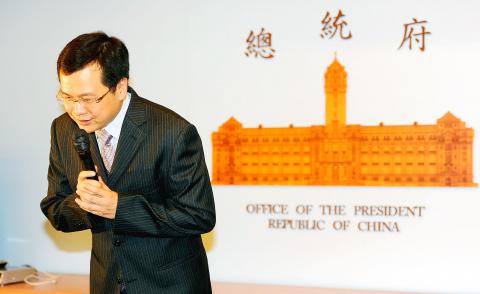Presidential Office Deputy Secretary-General Lo Chih-chiang (羅智強) resigned yesterday amid mounting speculation that allegations of influence peddling against Legislative Speaker Wang Jin-pyng (王金平) were politically motivated.
Following a statement on his Facebook page, Lo told a press conference about his decision, which he said centers on the “nature” of the allegations by the Special Investigation Division (SID) of the Supreme Prosecutors’ Office against “a speaker engaging in influence peddling in a judicial case.”
The SID on Friday last week accused Wang of illegally lobbying then-minister of justice Tseng Yung-fu (曾勇夫) and Taiwan High Prosecutors’ Office Head Prosecutor Chen Shou-huang (陳守煌) on behalf of Democratic Progressive Party caucus whip Ker Chien-ming (柯建銘) by urging the pair to stop a prosecutor from appealing Ker’s not-guilty verdict in a breach of trust case.

Photo: Chang Chia-ming, Taipei Times
“Think about this: If you were engaged in a lawsuit against Ker and you ended up losing the case because Ker had lobbied Wang to exert his influence on the judiciary to rule in his favor, would you be able accept this?” Lo said.
Lo said the influence-peddling case was just one of many reasons behind his resignation, which included personal reasons and his family.
“The influence-peddling case and how it has evolved have had a huge impact on me. I have stated on Facebook what I thought about the case. After resigning, I can say whatever I want to say,” Lo said.
Lo said that President Ma Ying-jeou (馬英九) had thought hard of the potential political fallout before he revealed the content of the SID’s probe, and that Ma had insisted on “fighting for his beliefs” so that the judicial system would be free of political interference.
“The involvement of a legislative speaker in influence peddling — is it difficult to distinguish between what is right and wrong in this case?” Lo asked.
He said that Wang’s alleged misconduct had overstepped the red line and violated the Constitution.
“Can we be indifferent?” he asked.
Lo refused to comment on the SID’s handling of the case, including questions about due process and the legitimacy of wiretapping Ker’s telephone, disclosure of the wiretaps transcripts and leaking the information to Ma while the investigation was still ongoing.
Rumored to be interested in running for mayor of Keelung, Lo said he wold not throw his hat into the ring.
His position will be filled in two weeks, Lo said.

SECURITY: As China is ‘reshaping’ Hong Kong’s population, Taiwan must raise the eligibility threshold for applications from Hong Kongers, Chiu Chui-cheng said When Hong Kong and Macau citizens apply for residency in Taiwan, it would be under a new category that includes a “national security observation period,” Mainland Affairs Council (MAC) Minister Chiu Chui-cheng (邱垂正) said yesterday. President William Lai (賴清德) on March 13 announced 17 strategies to counter China’s aggression toward Taiwan, including incorporating national security considerations into the review process for residency applications from Hong Kong and Macau citizens. The situation in Hong Kong is constantly changing, Chiu said to media yesterday on the sidelines of the Taipei Technology Run hosted by the Taipei Neihu Technology Park Development Association. With

‘FORM OF PROTEST’: The German Institute Taipei said it was ‘shocked’ to see Nazi symbolism used in connection with political aims as it condemned the incident Sung Chien-liang (宋建樑), who led efforts to recall Democratic Progressive Party (DPP) Legislator Lee Kun-cheng (李坤城), was released on bail of NT$80,000 yesterday amid an outcry over a Nazi armband he wore to questioning the night before. Sung arrived at the New Taipei City District Prosecutors’ Office for questioning in a recall petition forgery case on Tuesday night wearing a red armband bearing a swastika, carrying a copy of Adolf Hitler’s Mein Kampf and giving a Nazi salute. Sung left the building at 1:15am without the armband and apparently covering the book with a coat. This is a serious international scandal and Chinese

A US Marine Corps regiment equipped with Naval Strike Missiles (NSM) is set to participate in the upcoming Balikatan 25 exercise in the Luzon Strait, marking the system’s first-ever deployment in the Philippines. US and Philippine officials have separately confirmed that the Navy Marine Expeditionary Ship Interdiction System (NMESIS) — the mobile launch platform for the Naval Strike Missile — would take part in the joint exercise. The missiles are being deployed to “a strategic first island chain chokepoint” in the waters between Taiwan proper and the Philippines, US-based Naval News reported. “The Luzon Strait and Bashi Channel represent a critical access

COUNTERINTELLIGENCE TRAINING: The ministry said 87.5 percent of the apprehended Chinese agents were reported by service members they tried to lure into becoming spies Taiwanese organized crime, illegal money lenders, temples and civic groups are complicit in Beijing’s infiltration of the armed forces, the Ministry of National Defense (MND) said in a report yesterday. Retired service members who had been turned to Beijing’s cause mainly relied on those channels to infiltrate the Taiwanese military, according to the report to be submitted to lawmakers ahead of tomorrow’s hearing on Chinese espionage in the military. Chinese intelligence typically used blackmail, Internet-based communications, bribery or debts to loan sharks to leverage active service personnel to do its bidding, it said. China’s main goals are to collect intelligence, and develop a